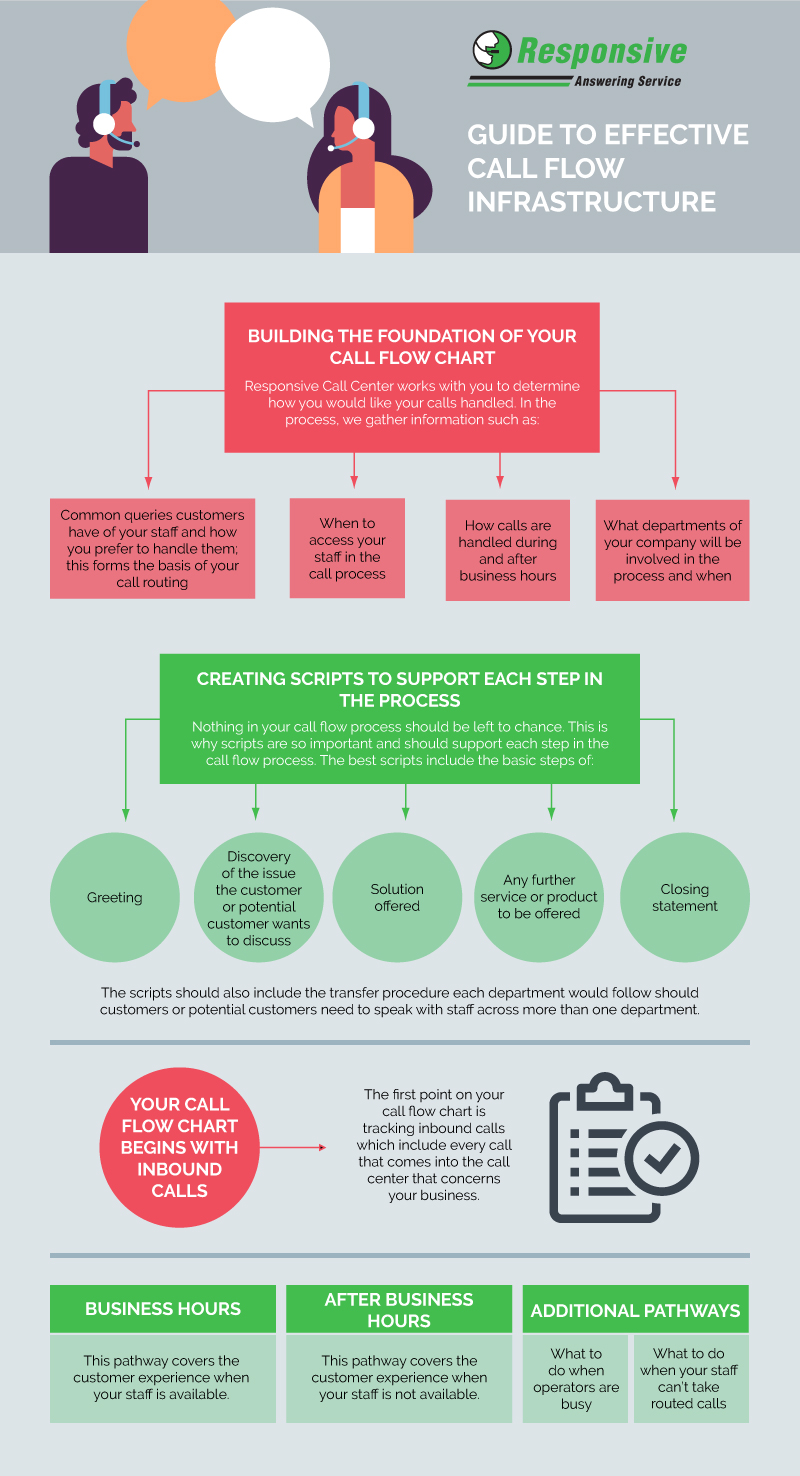
When you work with a highly professional call center, your calls become the focus of a very defined infrastructure that supports your customers 24 hours a day, 7 days a week, 365 days a year. At the center of that infrastructure is a map of how your calls are taken and routed. This is called your “call flow”. The goal of an effective and efficient call flow process is to make certain that none of your customers’ calls slip through any cracks in the call process.
What Is Call Flow?
Call flow refers to the path that a telephone call follows from the moment it is initiated by the caller to the moment it is completed or terminated. It includes all the steps and processes that occur during a phone call, including how the call is handled, routed, and managed within a business or organization’s telephone system.
Take a look at the following infographic that explains how we at Responsive Answering Service work with you to create the best call flow for your business, including how calls are routed and the different steps in place before and after speaking with an agent to ensure proper management and expectations are in place for an outsourced solution.
The elements involved in call flow can vary based on the complexity of the telephone system and the features it offers. Here’s a simplified overview of the typical components within a call flow:
- Incoming Call: The call flow begins when a caller dials a phone number to connect with the business or organization.
- Auto-Attendant or Interactive Voice Response (IVR): Many modern phone systems feature an automated greeting known as an auto-attendant or IVR. This system provides callers with options to select from (e.g., “Press 1 for Sales, Press 2 for Customer Support”).
- Call Routing: Depending on the caller’s selection or the number dialed, the call is routed to the appropriate department, extension, or individual. Call routing can be based on various criteria, such as time of day, caller ID, or the chosen option in the IVR.
- Holding and Music: If the desired recipient is busy or unavailable, the caller might be placed on hold. During this time, hold music or pre-recorded messages can be played to entertain or inform the caller.
- Call Queues: In some cases, calls might be placed in a queue if all available representatives are busy. Callers in the queue wait their turn to be connected to the next available agent.
- Agent Interaction: When the call is connected to an agent, the conversation between the caller and the representative takes place. This can involve discussing inquiries, providing assistance, or completing transactions.
- Call Recording: Some systems offer the option to record calls for quality assurance, training, or compliance purposes.
- Voicemail: If the caller reaches an unavailable recipient, the call might be directed to voicemail, where the caller can leave a message.
- Transfer and Forwarding: During the call, agents can transfer the caller to another department or colleague, or calls can be forwarded to another phone number if needed.
- Call Conclusion: The call concludes when either the caller or the agent ends the conversation. Depending on the system, post-call surveys or follow-up actions might be initiated.
A well-designed call flow ensures that callers are efficiently directed to the appropriate person or department, resulting in a positive and productive customer experience.
For more than 40 years, Responsive Answering Service has created and managed call flow for numerous industries, including medical, legal, transportation, commercial services (HVAC, landscaping, locksmith, plumbing, real estate, and property management) construction, energy & utilities, government agencies, leisure & travel, and charities. We have available all day, every day, to handle your calls the same way you or your team would so you do not have to rely on answering machines or automated systems. Our state-of-the-art equipment at Responsive Answering Service and highly trained staff allow us to make sure you never miss your customers’ calls. Contact us to discuss how Responsive Answering Service can help your business best manage the calls that are most important to you.

 Receive Your Free Consultation
Receive Your Free Consultation